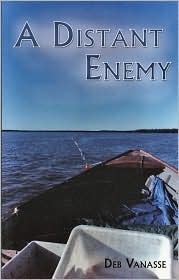
| Title | : | A Distant Enemy |
| Author | : | |
| Rating | : | |
| ISBN | : | 1578332273 |
| ISBN-10 | : | 9781578332274 |
| Language | : | English |
| Format Type | : | Paperback |
| Number of Pages | : | 179 |
| Publication | : | First published March 1, 1997 |
A Distant Enemy Reviews
-

I found this book both interesting and enjoyable. I felt that the story was realistic and the characters believable. Some things have obviously changed since the time when this book was written, so it might not ring as true for people living in small villages today. I would recommend it to middle grade readers interested in realistic fiction.
-

A sort of juvenile Things Fall Apart, A Distant Enemy chronicles a teenage boy's rage against the white man and the disintegrating traditions of his Yu'pik culture. The boy's rage is largely misplaced. Joseph is half white himself, and he's angry at the father who abandoned him when he was eight. He gets himself into a spot of trouble through an act of retributive vandalism, and the the hole is dug deeper when he's framed for theft. But his real problem is his inner turmoil, the hatred that is making him into a person he doesn't really want to be. In comes Mr. Townsend, an outsider, a dreaded white man who uses classic English Literature and compassion to draw Joseph out, communicate with him, and teach him a lesson about tolerance, a lesson Joseph's grandfather also tries to teach him. (In a reversal of norms, the older generation here is less alarmed by the encroachment of the white man, more aware of the improvements that have been made, than the younger generation.) The book is somewhat predictable, following a number of conventions, and nothing particularly unexpected happens. There's a lot of emotion and internal conflict, and I think this is the sort of books adults and teachers want young adults to read and think about, but which young adults don't actually much enjoy. The writing is good enough. The cultural details are well done. The best parts of the novel are when the grandfather is storytelling. The characters, other than Joseph, are not particularly well developed, but nor are they merely stock stereotypes.
Note: I received a free copy of this book in exchange for an honest review. -

I am from Athabascan country in Alaska. I have spent most of my life around Athabascan and Inuit people. I also lived for several years on the Upper Kuskokwim, which is where the Athabascan people meet the Yupik people. This the story of a Yupik boy, his family and his village.
One of the many things I enjoyed about the book is the identification with the village which appears to be unlike the relationship that people in Lower 48 have with their hometowns. For instance I would say that I am of Nenana even though I have not lived there since the mid-eighties. People will understand that I have a relationship to other people of my village which is almost family.
I am not of this teenagers generation and the people of my village do not have the language any longer as the Yupik people do. But I have seen the anger when visiting outlying villages in the eyes of teenagers. In fact I guess I am of the grandfather's generation, or close enough.
All of this I write to endorse all that is in this little book. It is true in the sense that fiction can be and which is almost impossible in nonfiction. I think that I have seen some people come to terms with that anger but sadly I have seen suicide and alcohol and drug abuse. Frankly I am glad this book ends on a positive note.
Thank you Deb for a wonderful little trip home. -

What I loved the most about "A Distant Enemy" is the constant yet subtle flavor of the Alaska Bush landscape and how it shadows every word, every movement.
Joseph is an endearing protagonist, and the simplicity of his attitudes and lifestyle makes for a quick and engaging read.
I did wonder a bit about Joseph's anger, which seems too large and deep for the reasons stated in the story. Yet he's a likable character and it's impossible not to root for him, not to want him to follow the right choices and ultimately find a happier way of interacting with both himself and the world.
All-in-all, "A Distant Enemy" is a fast-paced, believable and realistic read that examines such rural Alaska topics as racism, Native beliefs, modern vs. traditional viewpoints and the importance of family and community.
P.S. I must admit I became a bit teary-eyed at the ending, which to me is always the sign of a great book. -

Deb Vanasse has created for us very real character that likely embodies the feelings and struggles of many native peoples of Alaska and other parts of this country. Thankfully however, this book is not about injustice of the white man. It is instead about being non-judgmental and about how anger can eat you up inside until you ruin yourself (among other things). Though I was left with a few questions at the end, finding these lessons in such an entertaining story set in such a rich cultural and geographic backdrop was a pleasure.
-

I found the main character way to angsty. Maybe others can relate better, but I didn't take to his resentment.







